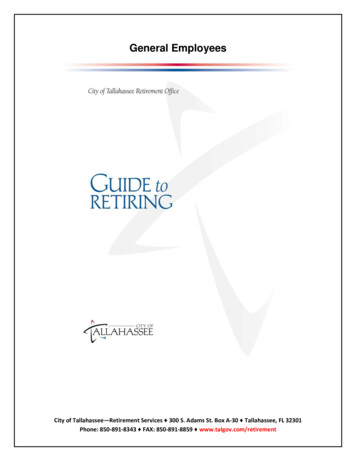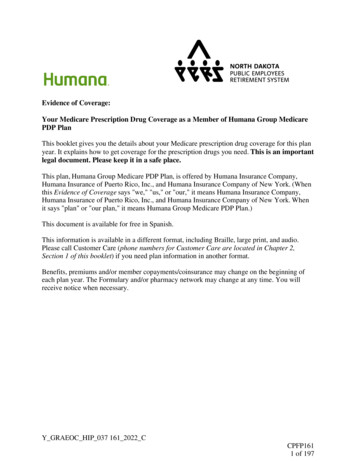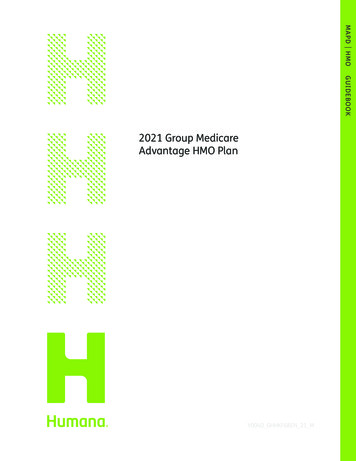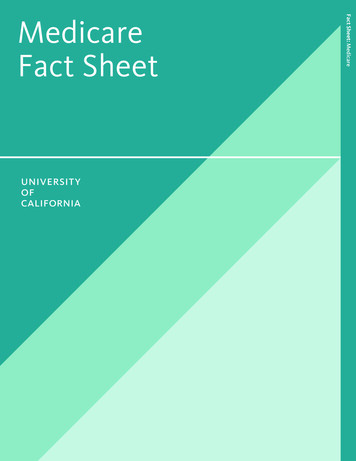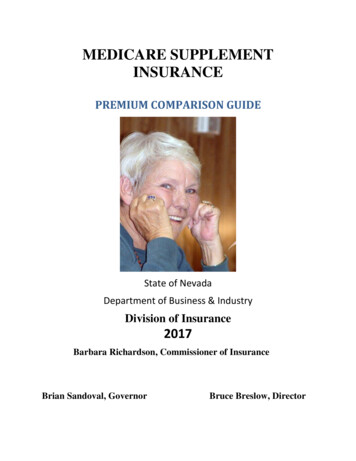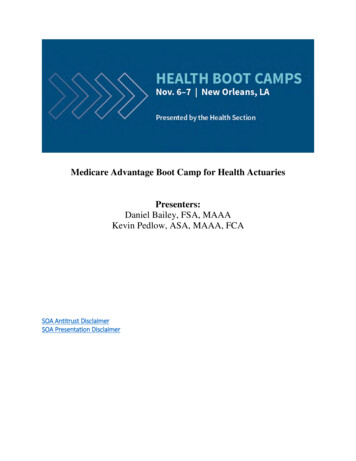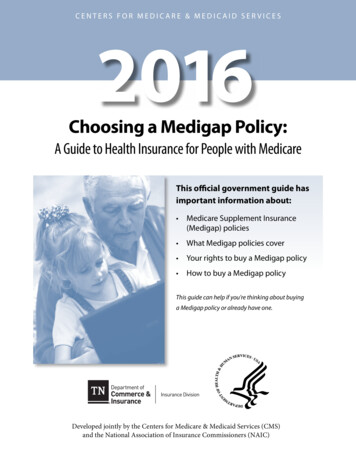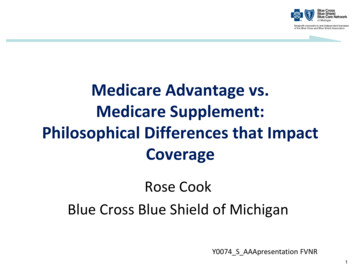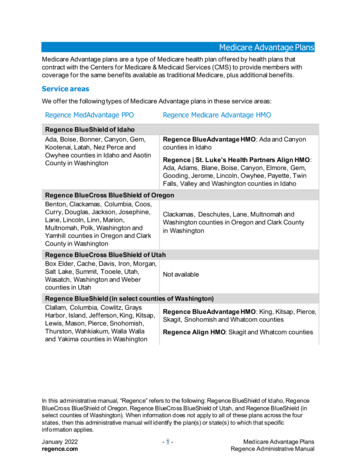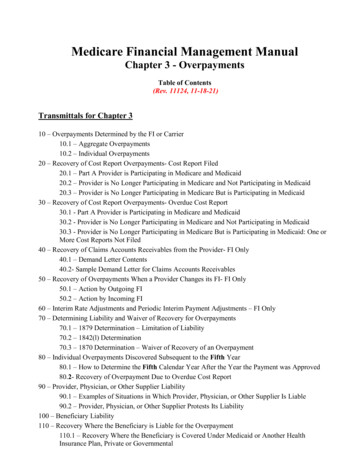
Transcription
Medicare Financial Management ManualChapter 3 - OverpaymentsTable of Contents(Rev. 11124, 11-18-21)Transmittals for Chapter 310 – Overpayments Determined by the FI or Carrier10.1 – Aggregate Overpayments10.2 – Individual Overpayments20 – Recovery of Cost Report Overpayments- Cost Report Filed20.1 – Part A Provider is Participating in Medicare and Medicaid20.2 – Provider is No Longer Participating in Medicare and Not Participating in Medicaid20.3 – Provider is No Longer Participating in Medicare But is Participating in Medicaid30 – Recovery of Cost Report Overpayments- Overdue Cost Report30.1 - Part A Provider is Participating in Medicare and Medicaid30.2 - Provider is No Longer Participating in Medicare and Not Participating in Medicaid30.3 - Provider is No Longer Participating in Medicare But is Participating in Medicaid: One orMore Cost Reports Not Filed40 – Recovery of Claims Accounts Receivables from the Provider- FI Only40.1 – Demand Letter Contents40.2- Sample Demand Letter for Claims Accounts Receivables50 – Recovery of Overpayments When a Provider Changes its FI- FI Only50.1 – Action by Outgoing FI50.2 – Action by Incoming FI60 – Interim Rate Adjustments and Periodic Interim Payment Adjustments – FI Only70 – Determining Liability and Waiver of Recovery for Overpayments70.1 – 1879 Determination – Limitation of Liability70.2 – 1842(l) Determination70.3 – 1870 Determination – Waiver of Recovery of an Overpayment80 – Individual Overpayments Discovered Subsequent to the Fifth Year80.1 – How to Determine the Fifth Calendar Year After the Year the Payment was Approved80.2- Recovery of Overpayment Due to Overdue Cost Report90 – Provider, Physician, or Other Supplier Liability90.1 – Examples of Situations in Which Provider, Physician, or Other Supplier Is Liable90.2 – Provider, Physician, or Other Supplier Protests Its Liability100 – Beneficiary Liability110 – Recovery Where the Beneficiary is Liable for the Overpayment110.1 – Recovery Where the Beneficiary is Covered Under Medicaid or Another HealthInsurance Plan, Private or Governmental
110.2 – Recovery From the Beneficiary110.3 - When to Suspend Efforts to Recover from the Beneficiary Following the Initial DemandLetter110.4 – Content of Demand Letter to Beneficiary110.5 – Sample Demand Letter to Beneficiary110.6 – Optional Paragraphs for Inclusion in Demand Letters110.7 – Recovery Where Beneficiary is Deceased110.8 – Beneficiary Wishes to Refund in Installments110.9 – Beneficiary Protests110.10 – When the FI or Carrier Does Not Take Recovery Action in Beneficiary Cases butConsiders Whether Waiver of Recovery is Applicable110.11 – Recording Overpayment Cases in Which the Provider is Not Liable- FI Only120 – Referral to the Department of Justice (DOJ)120.1 – Communication on Cases Sent to RO for DOJ Referral120.2 – Cases Referred to DOJ for Possible Litigation130 – Change of Ownership (CHOW)140 - Bankruptcy140.1 - Bankruptcy Forms140.2 - Basic Bankruptcy Terms and Definitions140.2.1 - Bankruptcy is Litigation140.2.2 - Types of Bankruptcies140.2.3 - Filing Bankruptcy Draws a Line in the Sand140.2.4 - Bankruptcy Affects Nearly All Medicare Operations140.2.5 - Recoupment and Set-off140.2.6 - Time is of the Essence140.2.7 - Definitions140.3 - Contractor's Establishment of Relationships to Ensure Effective Actions RegardingProviders In Bankruptcy140.3.1 - Contractor Staff Must Establish Relationships to Ensure That the RO andRegional Counsel Receive Prompt Notice of Provider Bankruptcies, so That MedicareCan Take Quick Action140.3.2 - Contractors Must Recognize and Advise RO Staff About Potential ProviderBankruptcies140.3.3 - Contractor Staff Will Establish a Relationship With the RO That hasJurisdiction Over the Bankruptcy140.3.4 - RO Jurisdiction Generally Parallels the Bankruptcy Court Where Case Is Filed140.3.5 - Contractor and Regional Office Bankruptcy Point of Contact Staff Member140.4 - Actions to Take When a Provider Files for Bankruptcy140.4.1 - Establish Effective Lines of Communications with Partners140.4.2 - Respond to RO Requests for Information140.4.3 - Immediate Contractor Directives From the RO140.4.4 - Tracking Debts/CO Communications140.5 - Chain Bankruptcies
140.5.1 - Chain Providers140.5.2 - Single Providers Serviced By a National Contractor140.6 - Affirmative Recovery Actions140.6.1 - Working with the RO and Regional Counsel's Office140.6.2 - Assumption of the Medicare Provider Agreement140.6.3 - Settlement Agreements or Stipulations140.6.4 - Recoupment140.6.5 - Administrative Freeze/Setoff140.7 - Preparing and Filing Proof of Claim140.8 - Closure Bankruptcy Cases And Treatment Of Overpayment Reporting Systems At EndOf Bankruptcy140.8.1 - Closing the Bankruptcy Case140.8.2 - Debt Located at the Debt Collection Center or Department of the Treasury140.8.3 - Managing Bankruptcy Debt at the Contractor Location150 – Accelerated Payments – FI Only150.1 – Eligibility for Accelerated Payment150.2 – Computation of the Accelerated Payment150.3 – Recoupment of the Accelerated Payment150.4 – Recoupment of the Accelerated PaymentExhibit 1 – Sample Format for Provider Request for Accelerated Payment160 – Termination of Collection Action160.1 – Termination of Collection Action – Provider Overpayments160.2 – Termination of Collection Action – Beneficiary Overpayments170 – General Overpayment Provisions170.1 – Offset of Overpayments Against Other Benefits Due- FI Only170.2 – When the FI or Carrier Does Not Attempt Recovery Action170.3 - Information and Help Obtainable from the Social Security Office (SSO)170.4 – Recovery Where Physician or Other Individual Practitioner isDeceased- CarrierOnly170.5 – Provider Offers to Settle on Compromise Basis170.6 – Unsolicited Overpayment Refunds170.7 – Timely Deposit of Overpayment Refund Checks170.8 – Informal Referral to RO180 – Reserved190 – Collection of Fee-for-Service Payments Made During Periods of Medicare Advantage (MA)Enrollment200 - Section 935 of the Medicare Modernization Act (MMA) - Limitation on RecoupmentOverpayments200.1 - Limitation on Recoupment Section 935(f)(2) Eligibility200.1.1 - Overpayments Subject to Limitation on Recoupment:200.1.2 - Overpayments Not Subject to Limitation on Recoupment200.1.3 - Adjustment of the Fee-For-Service Claims
200.1.4 – The Rebuttal Process and the Limitation on Recoupment200.1.5- Extrapolated 935 Overpayments200.1.6 – Medicare Secondary Payer (MSP) Provider Duplicate Primary Payment (DPP)200.1.7 – Immediate Recoupment Requirements for 935 Overpayments200.2 - Requirements for All Initial Demand Letters (Manual or Ecectronic)200.2.1 – 935 Initial Demand Letter200.2.2 - Recoupment After The Initial Demand: When Does it Begin?200.2.3 - Payments Made Upon Notice of Demand or Through An ImmediateRecoupment Request200.2.4 – Payment Suspension Relating to Limitation on Recoupment200.2.5 - Timeframe for Receiving, Validating and Flagging in the System toStop Recoupment for all Redetermination Requests200.3 - What to Do After the Validated Redetermination is Received200.3.1 - Outcome From the Redetermination Decision200.3.2 - Administrative Law Judge (ALJ) Third Level of Appeal200.4 - Extended Repayment Schedules (ERS) with an Appeal That is Subject to Limitation onRecoupment200.5 - Reserved for Future Use200.5.1 - Reserved for Future Use200.5.2 -Assessment of 935 Interest200.6 - Interest Rate and Calculation Periods for Appeal Decisions on Recouped Funds forPurposes of Paying 935 Interest200.6.1 - Calculations for Each 30-Day Period at the ALJ Decision or a FinalDetermination Date200.6.2 - Computing 935 Interest at the ALJ and Higher Levels200.6.3 - How to Calculate 935 Interest:200.6.4 - Obligation to Pay the Providers, Physicians, or Suppliers Late Payment Interest200.7 - Tracking and Report on Limitation of Recoupment Overpayments
NOTE: Revision 3 includes a cross reference to the source sections in current manuals. The manual isidentified by A1, A2, A3, or A4 for Intermediary Manual Parts 1 through 4; or by B1, B2, B3 or B4 forCarriers Manual Parts 1 through 4. This indicator is followed by a dash and the related section number.10 - Overpayments Determined by the FI or Carrier(Rev. 29, 01-02-04)Overpayments are Medicare payments a provider or beneficiary has received in excess of amounts dueand payable under the statute and regulations. Once a determination of an overpayment has been made,the amount is a debt owed by the debtor to the United States Government.Under the Federal Claims Collection Act of 1966, as amended, each agency of the Federal Government(pursuant to regulations jointly promulgated by the Attorney General and the Comptroller General of theU.S.) must attempt collection of claims of the Federal Government for money arising out of theactivities of the agency. The FI or carrier will not be liable for overpayments it makes to debtors in theabsence of fraud or gross negligence on its part, however once an intermediary or carrier determines anoverpayment has been made it must attempt recovery of overpayments in accordance with CMSregulations.The Federal Claims Collection Act requires timely and aggressive efforts to recover overpayments,including efforts to locate the debtor where necessary, demands for repayment, and establishment ofrepayment schedules, suspension of interim payments by intermediaries to institutional providers, andrecoupment or setoff, where appropriate.In addition, The Debt Collection Improvement Act of 1996 requires Federal agencies to refer eligibledelinquent debt to a Treasury designated Debt Collection Center (DCC) for cross servicing and offset.CMS is mandated to refer all eligible debt over 180 days delinquent for cross servicing and offset.This chapter deals with two general types of overpayments.Aggregate overpayments involve a group or all of a Part A provider’s claims, e.g., overpaymentsdiscovered at cost-report settlement time or change of FI, overpayments resulting from a pattern ofimproper application of Medicare coverage provisions, overpayments resulting from a periodic interimpayment adjustment, situations involving provider failure to file a cost report, or occasions of fraud orprogram abuse. Aggregate overpayments are described in §10.1, §20 and §30 of this chapter andChapter 4, Debt Collection.Individual overpayments refer to incorrect claims payment for services under Part A or Part B.Individual overpayments are described in §10.2, §80ff and Chapter 4, Debt Collection. MedicareSecondary Payer (MSP) instructions can be found in the Medicare Secondary Payer Manual, CMSPublication 100-5.10.1 - Aggregate Overpayments(Rev. 29, 01-02-04)A. Stitutional Providers Serviced By FisAggregate overpayments to providers (overpayments arising in other than individual cases) may occurby: A pattern of furnishing and billing for excessive or noncovered services (see Program IntegrityManual);Inclusion of non-allowable or excessive costs in the provider's cost report;
Excessive interim payments made to the provider;Failure to repay accelerated payments;Failure to file cost reports (Chapter 3, §30);orDetermination of amounts due upon filing the cost report, during desk review, final settlementand reopening of the cost report.10.2 - Individual Overpayments(Rev. 29, 01-02-04)An individual overpayment is an incorrect payment for provider or physician services made under titleXVIII.Examples of individual overpayment cases are: Payment for provider, supplier or physician services after benefits have been exhausted, or wherethe individual was not entitled to benefits. Incorrect application of the deductible or coinsurance. Payment for noncovered items and services, including medically unnecessary services or custodialcare furnished an individual. Payment based on a charge that exceeds the reasonable charge. Duplicate processing of charges/claims. Payment to a physician on a non-assigned claim or to a beneficiary on an assigned claim.(Payment made to wrong payee.) Primary payment for items or services for which another entity is the primary payer Payment for items or services rendered during a period of non-entitlement.20 - Recovery of Cost Report Overpayments- Cost Report Filed(Rev. 29, 01-02-04)Providers of services under Part A of the Medicare program are normally required to submit a costreport. A cost report must be submitted for each cost reporting year or upon termination of theMedicare agreement.20.1 - Part A Provider is Participating in Medicare and Medicaid(Rev. 29, 01-02-04)When the provider files a cost report indicating an overpayment, a final determination is deemed to haveoccurred if the cost report is not accompanied by payment in full. Where the provider does not remit theoverpayment in full, the FI sends the first demand letter notifying the provider that it will reduce orsuspend interim payments in 15 days if the provider does not make repayment arrangements.If an overpayment is determined as a result of a tentative settlement, final settlement, interim rateadjustment, or reopening the FI sends the first demand letter within 7 calendar days. (See Chapter 4,§20)When the Notice of Program Reimbursement (NPR), which is sent at the conclusion of an audit, resultsin an overpayment a first demand letter must also be sent. The NPR and the first demand letter may besent simultaneously, the first demand letter may be sent as a separate document or the first demand letter
may be incorporated into the NPR. If the issuance of the NPR changes the facts as stated in priordemand letters, the FI shall include in the NPR an explanation of the revised overpayment amount.See Chapter 4, §40 to determine if the overpayment requires a withhold of payments.If the provider does not respond within 30 days after the date of the first demand letter, the FI sends asecond demand letter notifying the provider of the FI’s intent to recoup the overpayment from interimpayments. (If the current percentage of withhold is less than 100%, the demand letter shall state thatinterim payments will be withhold at 100% in 30 days if repayment arrangements are not made.) Ifappropriate, the FI shall advise the provider that action to withhold its Federal share of Medicaidpayments has been requested. The FI shall attempt to make personal (or telephone contact) with theprovider, 15 days after sending the second demand letter to encourage either a lump-sum refund or arequest for an extended repayment plan. It shall document each contact. (See Chapter 4, §10-20)If there is no response or if the overpayment is still outstanding 30 days after the date of the seconddemand letter the FI shall send a third demand letter. If eligible, the third demand letter shall includenotification of the intent to refer the entire debt to the Department of Treasury for additional collectionaction. (See Chapter 4, §20)20.2 - Provider is No Longer Participating in Medicare and Not Participating inMedicaid(Rev. 29, 01-02-04)If the FI becomes aware that there is an imminent likelihood that a provider will be terminating from theMedicare program it shall contact the RO with regard to future collection efforts.If the FI discovers an overpayment upon the filing of a cost report, or on determination of programreimbursement, with respect to a provider no longer participating in Medicare, it shall immediatelycontact the terminated provider to obtain a refund in a lump-sum, if it has not been made.The first demand letter shall be sent and all subsequent collection activities performed as specified in§20.1 and Chapter 4, §10-20.If the terminated provider has sold the entity to a participating provider refer to Chapter 3, §130 for changeof ownership instructions.20.3 - Provider is No Longer Participating in Medicare But Is Participating inMedicaid(Rev. 29, 01-02-04)If the FI discovers an overpayment upon the filing of a cost report, or on determination of the amount ofprogram reimbursement for a former Medicare provider that is still participating in Medicaid, it shallimmediately contact the provider to obtain a refund in a lump sum, if it has not been made.The first demand letter shall be sent and all subsequent collection activities performed as specified in§20.1 and Chapter 4, §10-20.The first demand letter must provide notice (See Chapter 4, §10-20 and §60) that action to withhold itsFederal share of Medicaid payments will be requested if repayment arrangements are not made within15 days of the date of this notice. The second demand letter must provide notice that action to withholdits Federal share of Medicaid payments has been requested and will be initiated if repaymentarrangements are not made. The FI shall send the third demand letter 30 days following the secondwhere the provider has not responded, even though procedures for withholding the Federal share ofpayments in title XIX have been initiated, so that if recoupment efforts and withholding of Medicaidfunds are not effective, the case will be ready for referral to the Department of Treasury.
If the terminated provider has sold the entity to a participating provider refer to Chapter 3, §130 for changeof ownership instructions.30 - Recovery of Cost Report Overpayments - Overdue Cost Report(Rev. 29, 01-02-04)When a provider fails to submit a cost report by the due date the FI shall take recovery action to notifythe provider that submission of the cost report is required and that additional collection action willcontinue until an acceptable cost report is submitted.30.1 - Provider is Participating in Medicare and Medicaid(Rev. 29, 01-02-04)A. GeneralFor a participating provider, the cost report required for each cost report period is due on or before thelast day of the fifth month following the end of that particular cost report period. For cost reportsending on a day other than the last day of the month, cost reports are due 150 days after the last day ofthe cost reporting period.If no cost report has been received by the seventh day after the due date (including extensions), the FImust send the first demand letter in Chapter 4, §20. (The seven-day timeframe allows for processingand mail time.) In addition the FI must initiate 100% suspension of all Medicare payments on day sevenif the cost report has not been received, an extension request has not been received and approved or areduction in the rate of suspension has not been approved. (See Chapter, )If the provider does not respond within 30 days of the first demand letter, the FI shall send the seconddemand letter. (See Chapter 4, §20)The FI shall make a personal (or telephone) contact with the provider 15 days after mailing thesecond demand letter. It shall determine any problems the provider might be having in preparingthe cost report, and if, and when, the provider expects to complete and submit it. It shalldocument the provider's response.If the provider does not respond within 30 days of the second demand letter, the FI shall send the thirddemand letter. (See Chapter 4, §20)30.2.-.Provider is No Longer Participating in Medicare and Not Participating inMedicaid30.3 - Provider is No Longer Participating in Medicare But is Participating inMedicaid: One or More Cost Reports Not Filed(Rev. 29, 01-02-04)Where a provider's agreement under title XVIII has terminated and one or more cost reportshave not been submitted the FI shall send the first demand letter. Requirements for this letter arein Chapter 4, §20. Since this situation involves not only a terminated provider but a provider thathas failed to meet the basic obligation (submission of a cost report) for the period when it didparticipate, the first demand letter provides notice that initiation of the procedure for withholdingthe Federal share of Medicaid payments will begin in 15 days if the FI does not receive the costreport.
The FI shall continue sending demand letters to the provider. (Chapter 4, §20 for the requirements forthe second and third demand letters) The demand letters must be sent at 30-day intervals where theprovider has not responded even though the procedures for withholding the Federal share of Medicaidpayments have been initiated.) This must be done so that if recoupment efforts and the withholding ofMedicaid payments are not effective, the case will be ready for referral to the Department of Treasury.40 – Recovery of Claims Accounts Receivables from the Provider - FI(Rev. 29, 01-02-04)Intermediary claims A/R arises from adjustments in the intermediary’s claim processing systems (thistype of adjustment may also be referred to as a carryover adjustment). Some of the reasons theseadjustments occur include the duplicative processing of a claim, payment of a claim at the wrongDiagnostic Related Group (DRG) rate, a request from a provider, a determination by the intermediary thatan adjustment was required, or an adjustment created from a credit balance report, CMS-838. Theseadjustments are normally recovered through the recoupment of future claims and the recovered amountsare included in the remittance advices to the providers. For additional information see Chapter 4,§70.15.2.40.1 – Demand Letter Contents(Rev. 315, Issued: 05-17-19, Effective: 06-18- 19, Implementation: 06-18-19)The term Medicare beneficiary identifier (Mbi) is a general term describing a beneficiary’s Medicareidentification number. For purposes of this manual, Medicare beneficiary identifier references both theHealth Insurance Claim Number (HICN) and the Medicare Beneficiary Identifier (MBI) during the newMedicare card transition period and after for certain business areas that will continue to use the HICN aspart of their processes.The FI will demand an overpayment resulting from a claims adjustment if the claims adjustment has hadno recoupment in the past 60 days.The demand letter must include the following information: That an overpayment was made; That interest will begin to accrue if the overpayment is not paid in full within 30 days; The name and Medicare beneficiary identifier of the beneficiary involved; The dates and types of services for which the overpayment was made to include sufficientinformation for the provider to identify the overpayment; How the overpayment was calculated; Why it is liable for recovery of overpayment (i.e., the reasons for finding the provider at fault); That recoupment of the overpayment from all available payments is occurring; A reference to the Appeals rights in the remittance advice;40.2- Sample Demand Letter for Claims Accounts Receivables(Rev. 41, 04-30-04)Below is a sample demand letter that FIs may use when demanding Claims Accounts Receivables. TheExtended Repayment Plan enclosure can be found at Chapter 4, §20, Exhibit 2.Date
Certified MailName/AddressRe:Provider NumberClaims Accounts ReceivableDear :On , a claim adjustment was entered in our system under provider for . Since then, adjustments were made to the claim and a balance in the amount of has been outstanding for 60 days. As this amount has not been recouped throughclaims submission, the purpose of our letter is to request that this amount be repaid to our office. Foryour reference, a copy of the Claims Accounts Receivable Transaction Summary is enclosed. (Insert thename of the detailed summary report enclosed. This report should include sufficient information neededby the provider to identify the overpayment).Submit your check payable to , to the following address:In order to ensure that your check is credited to this overpayment, please enclose a copy of this letterwith your payment.Until payment in full is received or an acceptable extended repayment request is received all paymentsdue to you are being withheld. (This includes claims, settlement amounts, or interim payments.) If youhave reason to believe that withhold should cease you must notify our office before andprovide documentation as to why this withholding action should not continue. We will review yourdocumentation, but will not delay recoupment during the review process. This is not an appeal of theoverpayment determination.In addition, in accordance with 42 C.F.R. §405.378, simple interest at the rate of % will be chargedon the unpaid balance of the overpayment, beginning on the 31st day. Interest is calculated in 30-dayperiods and is assessed for each full 30-day period that payment is not made on time. Thus, if paymentis received 31 days from the date of this letter, one 30-day period of interest will be charged. Eachpayment will be applied first to accrued interest and the remaining amount to principal.Additional interest of will be assessed against the principal balance on and will continue toassess at the rate of % a year for each 30-day period the principal amount remains unpaid. Inaddition, please note that Medicare rules require that payment be either received in our office by orUnited States Postal Service postmarked by that date in order for the payment to be considered timely.A metered mail postmark received in our office after will cause an additional month’s interest to beassessed on the debt.We request that you refund this amount in full. If you are unable to make refund of the entire amount atthis time, please advise our office immediately so that we may determine if you are eligible for arepayment schedule (See enclosure for details). Any repayment schedule (where one is approved)would run from the date of this letter. If we do not hear from you, your interim payments will continueto be withheld and applied towards the outstanding overpayment balance. Any amount withheld willnot be refunded.
If you feel you have reason to appeal this adjustment, please refer to the original remittance advice datedfor additional instruction.If you have filed a bankruptcy petition or are involved in a bankruptcy proceeding, Medicare financialobligations will be resolved in accordance with the applicable bankruptcy process. Accordingly, werequest that you immediately notify us about this bankruptcy so that we may coordinate with both theCenters for Medicare & Medicaid Services and the Department of Justice so as to assure that we handleyour situation properly. If possible, when notifying us about the bankruptcy, please include the namethe bankruptcy was filed under and the district where the bankruptcy is filed.If you have a question regarding why these adjustments were made, please contact our at. If we can assist you further in the resolution of this matter, we will be glad to do so. Welook forward to hearing from you shortly.Sincerely,(name and title)50 - Recovery of Overpayments When a Provider Changes Its FI- FI Only(Rev. 29, 01-02-04)Where CMS approves a change of FI, the change is effective on the first day following the close of thefiscal year in which the provider gave timely notice. (See Medicare Claims Processing, Chapter 1,General Billing Requirements.)50.1 Action By Outgoing FI(Rev. 29, 01-02-04)The outgoing FI is responsible for effectuating final settlement for the cost report periods during whichit serviced the provider. It issues the reminder letter to ensure the timely receipt of the cost report aswell as any NPRs and demand letters. The outgoing FI is also responsible for assuring that theincoming FI is aware of the outstanding overpayment and that recoupment is initiated by thewithholding of interim payments, if necessary. If the overpayment remains uncollected, the outgoing FIis responsible for initiating the withholding of Title XIX payments (Medicaid) and for referring theoverpayment to the Department of Treasury. The outgoing FI must copy the incoming FI on allcorrespondence with the provider to ensure a timely collection process.A. Notification to Incoming FIWhen the outgoing FI is notified by the RO that the provider's request for a change of FI has beenapproved, it shall notify the incoming FI in writing of all outstanding program overpayments. Itshall include: The cost reporting period; The date the overpayment was determined; Explanation of the type of overpayment, e.g., cost report overpayment - desk review, cost reportoverpayment - audit; The current status of collection action, including any withhold that is currently in place to recoupthe overpayment; and
The original balance of the overpayment and the current principal and interest balance of theoverpayment.The outgoing FI should also notify the incoming FI of future settlements that will be occurring and ofany unfiled cost reports.B. Notice of Intent to Suspend Interim PaymentsIf at the time of the change of FI the outgoing FI is recouping an overpayment by the withholding ofinterim payments the incoming FI will continue the withhold. The outgoing FI must notify the providerthat the withhold will be continued by the incoming FI until the overpayment is liquidated or anacceptable ERS is approved. In addition, the outgoing FI must notify the incoming FI of the details ofthe withhold.If after the change of FI occurs the outgoing FI determines that an overpayment exists the outgoing FImust notify the provider in accordance with normal procedures. The current FI should receive a copy ofall NPRs and demand letters. The outgoing FI must contact the current FI to make sure that recoupmentbegins when necessary.50.2 – Action by Incoming FI(Rev. 29, 01-02-04)The incoming FI is responsible for effectuating final settlements for the cost report periods after thechange of FI becomes effective. If the FI receives a cost report from a prior period it should forward itto the outgoing FI to make the final settlement. If the outgoing FI is no longer participating in theMedicare program, the incoming FI shall contact the RO for further instructions.After the outgoing FI has completed its review of the cost report, it notifies the incoming FI whether thecost report is acceptable, and the final settlement. The incoming FI, in accordance with Ch. 4, §40,disposes of funds with
Medicare Financial Management Manual Chapter 3 - Overpayments. Table of Contents (Rev. 11124, 11-18-21) Transmittals for Chapter 3 . 10 - Overpayments Determined by the FI or Carrier. 10.1 - Aggregate Overpayments. 10.2 - Individual Overpayments. 20 - Recovery of Cost Report Overpayments- Cost Report Filed
